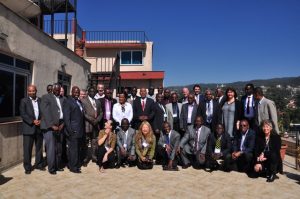Collaborate or Lose the Fight against Wildlife Crimes in HoA
HAWEN and its Progress
(By Gemechu Bekele)

Would you be surprised if you saw caged African lions and cheetah cubs in China or horns of African Rhino in Asian markets? You shouldn’t be! The illegal wildlife market is growing at an alarming rate in these parts of the world. Even worse, the market is becoming more lucrative and sophisticated, rendering it difficult to control and regulate. An article published in The Atlantic in 2013 stated that a rhino horn could be sold up to $300,000 USD in Vietnam.
At Bole Airport in Addis Ababa, wildlife products such as ivory have been confiscated on many occasions while being smuggled from West and Central Africa to the Middle East, the Arabian Peninsula, and China. Authorities have also recorded several incidents of illegal live animal trafficking from the Horn of Africa to other Asian. This happened not only at Bole, but also at Jommo Kenyatta and other airports in the Horn of Africa. Therefore, the Horn of Africa is becoming a major source and transit route of wildlife products and live animals.
Animal species such as African Lions and Rhinos, Cheetah, and Pangolin are on the verge of extinction mainly due to wildlife crimes and illegal trade. These are on the banned list of the Convention on International Trade in Endangered Species of Wild Fauna and Flora (CITES).
Wildlife crimes affect not only the smuggled animal population but also human beings. It impacts our ecosystems, livelihoods, peace, security, and sustainable development. Extinction of an elephant species, for example, could mean loss of biodiversity. The market for illegal rhino horn could lead to a proliferation of illegal weapons, which would have, in turn, a negative impact on security.
Countries in the Horn of Africa have made national laws to control wildlife crimes within their territorial boundaries. But little progress has been made to unite efforts to control the crimes, which are trans-boundary in nature. However, disconcerted efforts are gradually giving a way to a coordinated effort through a new initiative known as Horn of Africa Wildlife Enforcement Network (HAWEN).
HAWEN was initiated back in 2012 with the aim to share information on wildlife crimes in the Horn of Africa countries (Djibouti, Ethiopia, Kenya, Somalia, South Sudan, Sudan and Uganda), to promote uniform law enforcement standard across the region and to coordinate capacity building and training. But HAWEN has not yet been officially established.
During its 3rd Steering Committee meeting that took place in Addis Ababa from 7 – 8 December 2016, HAWEN entered a new phase. In this meeting, its members (mainly representatives from wildlife authorities of the 7 partner countries) unanimously agreed on the need to establish HAWEN’s Secretariat to tackle wildlife problems in the region. The meeting also adopted important decisions on the structure, website, and future communication and engagement of HAWEN. One such engagement is working with non-IGAD countries such as Tanzania and Yemen in order to successfully meet HAWEN’s goal.
So far HAWEN’s Steering Committee, which is mandated to pave the way for the formal establishment of HAWEN, has built positive communication with most governments in the region, and the responses it has received are encouraging. The governments have shown a willingness to have a strong regional network to fight wildlife crimes. IGAD, which is expected to endorse the establishment of HAWEN in early 2017, has shown its commitment to support the new initiative.
When it is fully operational, it is hoped that HAWEN will build a strong network that will successfully abate the alarming wildlife crimes in the Horn of Africa. HoA-REC&N’s Wildlife Crimes Prevention Programme (WLCP) has been supporting the actions and processes that lead to the establishment of HAWEN.
